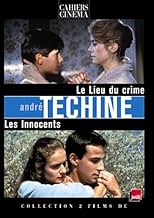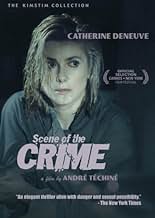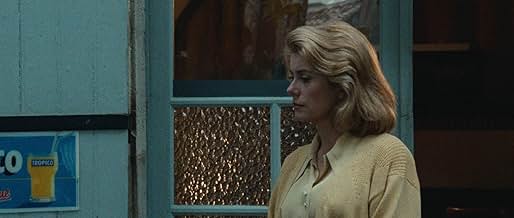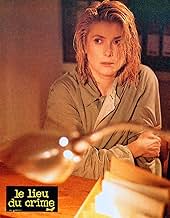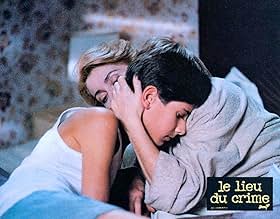Ajouter une intrigue dans votre langueIn the woods, a 13-year-old boy is grabbed by an escaped convict and told to bring money later that day. The boy does as he's told, only to be attacked by the convict's partner. A murder ens... Tout lireIn the woods, a 13-year-old boy is grabbed by an escaped convict and told to bring money later that day. The boy does as he's told, only to be attacked by the convict's partner. A murder ensues, and through happenstance, the murderer and the boy's mother form an alliance. All thi... Tout lireIn the woods, a 13-year-old boy is grabbed by an escaped convict and told to bring money later that day. The boy does as he's told, only to be attacked by the convict's partner. A murder ensues, and through happenstance, the murderer and the boy's mother form an alliance. All this takes place in four days during which the boy has his first communion, his separated par... Tout lire
- Prix
- 3 nominations au total
- Suzan
- (uncredited)
Histoire
Le saviez-vous
- AnecdotesThe film underwent an HD restoration in 2018 by Eclair, with the support of Arte France's cinema unit and MK2 Films.
- GaffesWhen Thomas first tries on his suit that "itches", his top shirt button is undone. But when he undresses in his room shortly after that, he undoes that button too.
- Autres versionsVideo version runs 74 minutes.
- ConnexionsFeatured in Danielle Darrieux: Il est poli d'être gai! (2019)
"Scene of the Crime" has many of the virtues of "Wild Reeds,"--a film that will inhabit you for weeks after you've seen it--chief among them Techine's intelligence and sensitive handling of character and flair for melodrama. If Thomas Hardy were alive today, he'd probably be Techine's script-writer.
The film's two concerns are repression and freedom. Thomas--a sullen angry 13 year old--and Lili--his dreamy, distractedly neurotic mother-- undergo several collisions and unions with a young escaped convict and his friends: they are left to pick up the pieces and reconfigure their lives. Both mother and son are bound by a repressions whose roots are in family, community and religion. And each conflict with others binds them like a rope, so that Thomas futilely lashes out in anger while Lili attempts to lose (and in doing so) find herself with an act of impulsive negation. We could trace much of the repression toward the less likable characters--other criminals or family members--but doing so is futile. Techine understands what Renoir meant when said "everyone has his reasons," and so this film isn't about the difficulty of living with other people, but the difficulty of living in this universe.
Techine has often been called a "novelistic" director; meaning he takes you deep inside his characters' thoughts and motivations. This doesn't involve voiceover, just Techine's direction and the melodramatic plots that force their characters into confrontations ordained by the strength of their passions. Melodrama asks the most of its characters; requires them to feel and undergo all they can. It's numerous coincidences, and run-ins can seem like an amplified version of life's randomness and havoc. Techine's approach involves an analytical acceptance of melodrama's approach to narrative; a willing and measured use of its conventions, resulting in narratives that often seem more vivid than reality and paradoxically more truthful and satisfying. The emotions unearthed are more intense than those brought out by reality, but possess the inner truth of reality.
His technique is not flashy, attention-getting or hyper-formalistic: which means it works discreetly and extremely well. There is an ever-present analytical attention to the natural (and un-) surroundings that surround his characters, along with an intense intimacy toward them. He follows very few rules, and mixes quick cutting with measured long takes and a mobile camera. All this allows us to move back and forth and toward and away from his characters, sympathizing with them in close-up one moment, then judging at a detached angle or pan to another character's reaction. It is a wonderfully effective method, and constantly reminds us of each character's motivations (as do the relentless melodramatics.)
Techine's films aren't formally difficult, but if you lose track at one point it's hard to catch up, because his characters will have accumulated even more motivations and reactions by then. The intense sensitivity of his style allows us to accurately register each character's accumulating layer of emotions, which continually enlarge their motivations. To lose track of that accumulative process is probably what happened to Roger Ebert, who wrote the film should have been a gangster drama made in 1939, so that the melodramatic plot would seem more acceptable and Techine's moments of psychological insights wouldn't seem so "out of place." (The film IS primarily flawed in the sketchiness of the convict's lover and the overly-rushed pace of the climactic sequence.)He doesn't consider that the melodrama of the plot is precisely what allows for those moments of psychological insight. And desire for the film to be an old-fashioned crime noir seems inexplicable, when this is obviously a family drama where crime serves to provoke a shake-up and re-evaluation of family relations and the life-directions the characters have chosen. At the end of "Scene of the Crime" we're not sure whether Thomas and Lili have either recovered or damaged forever. And as Lili hauntingly remarks, after a certain point, losing and finding yourself may be the same process.
- Revelator_
- 25 août 2001
- Lien permanent
Meilleurs choix
- How long is Scene of the Crime?Propulsé par Alexa
Détails
- Date de sortie
- Pays d’origine
- Langue
- Aussi connu sous le nom de
- Scene of the Crime
- Lieux de tournage
- Auvillar, Tarn-et-Garonne, France(street scenes, hotel, bridge over river)
- sociétés de production
- Consultez plus de crédits d'entreprise sur IMDbPro
Box-office
- Brut – États-Unis et Canada
- 164 187 $ US
- Durée1 heure 30 minutes
- Mixage
- Rapport de forme
- 2.35 : 1
Contribuer à cette page


![Regarder Bande-annonce [OV]](https://m.media-amazon.com/images/M/MV5BMGZlMGQ4MjQtNTJkNC00MmMzLWFhYzgtMjZlNWFmY2NhMGY0XkEyXkFqcGdeQXRyYW5zY29kZS13b3JrZmxvdw@@._V1_QL75_UX500_CR0)
